Today I'm bringing you a plotting technique I call "Death by Surprise," and it works as a great pinch to your readers. It can give them a twinge of suspense, shock, dread, and sorrow all at once. It works like this:
Your character is battling his way through your story, facing villain, monsters, or whatever kind of obstacles you are throwing his way. Then something out of the blue actually inflicts a fatal wound to him. It's something the character (and maybe the reader too) never saw coming. The intensity of this plotting technique comes from the shock and surprise the character has as he realizes, he's come so far only to die from this.
Let's look at examples to see some different ways "Death by Surprise" can be done.
Example 1:
In the Lord of the Rings films, Frodo suffers all kinds of ailments and faces all kinds of enemies; he even makes it into Mordor and through Shelob's lair. Just when he thinks he's safe from the giant spider, it stings him.It's not completely out of the blue, but Frodo doesn't expect it. We've watched him come so far, so it's painful to see him get stung. It's like--how can that happen? Now? When he's so close?
In this example, the audience sees Shelob sneaking up on him, but Frodo doesn't (that creates an added layer of suspense). It's not a surprise for us, but it is for Frodo. That moment is like a pinch to me every time.
Example 2:
In Fullmetal Alchemist: Brotherhood, protagonist Edward Elric battles villains with alchemy. We've watched him overcome all kinds of fights with bad guys, and we've watched him overcome his own personal obstacles--the death of his mom, the abandonment from his father, the loss of two of his limbs, his complicated feelings over the predicament of his brother. We know how iron-willed Edward is. Nothing stops him. He works to overcome whatever life throws at him, all without whining.In one episode, Edward uses alchemy to make damp dynamite explode, finally defeating some henchmen. He (and the audience) thinks he's overcome an obstacle once again only to realize a second later that a spike of wood from the blast has pierced straight through him, pinning him to the ground.
And he's going to die.
It's so unexpected. It's like a freak accident. And it's going to do our hero in. And the tragic irony of it is that it's an accident he inflicted on himself. It's like, how the heck did that just happen?!
In this example, because the audience doesn't see it coming, we're just as shocked as Ed.
Example 3:
In Dragon Ball Z protagonist Goku is the most powerful person in the world. He's like a super hero, defeating dozens of god-like villains. He's pushed further than any other person of his kind. He's powerful enough to destroy a planet, if he wanted to. Then at one point in the series, he discovers he's going to die from an incurable illness that infects the heart.And the audience is like, "Are you even kidding me?" Goku doesn't even get to die in a battle against an evil villain? Defending Earth? With honor? He's going to die. From something he can't even fight. Sick, lying in bed. While his family takes care of him. What is this madness?
See how wicked awesome this technique can be? A key element to it is tragedy. And it's the irony of it that makes it tragic.
How it Works and How to Mess it Up: Tragedy and Irony
You've got to get the irony and tragedy just right for this or it can have the opposite effect on the readers and make them feel cheated.For example, you know how President Snow died in Mockingjay? Some readers felt cheated. Spoiler alert, he basically died by a freak accident, and my friend said, "That's like Voldemort dying from a cold." I have a different opinion on it, but that's for another post. But President Snow's death wasn't tragic (yeah, he's a villain, but villains can experience tragedy too). It was ironic, kind of, in a circumstantial way, but it wasn't ironic to his character; it wasn't out of the blue that he choked from his own ailments.
Also, spoiler alert, note that none of the protagonists in my examples actually ended up dying from those fatal afflictions. If Goku had died from that illness, the series could have still progressed in a satisfying way. There are other characters who shoulder the title of protagonist that we love just as much.
I think if Frodo or Ed had died in those instances, it would have been trickier for the writers to handle. Frodo's would be tragic enough, and it would have happened close enough to the story's end, that I think they could have pulled it off if wanted, but it made a better story to keep Frodo alive longer. If Ed died in that moment, I think the audience would have been furious. It was a bad place in the story's structure for him to die.
I used main characters for my examples, but you can also look at doing this with other characters. It would be easier to kill off a friend or family member this way than it would be the protagonist.
In closing, when you're plotting your story, consider throwing in "Death by Surprise." Build up the tragedy through irony and then really capture that moment when your character is in shock, that moment where she realizes what's just happened and what it means, that's when you really pinch your reader.
I hope that if last week's post on plotting tools struck you that you've starting a toolbox. Feel free to add this one to it.



























Thanks for the Advice!
ReplyDelete